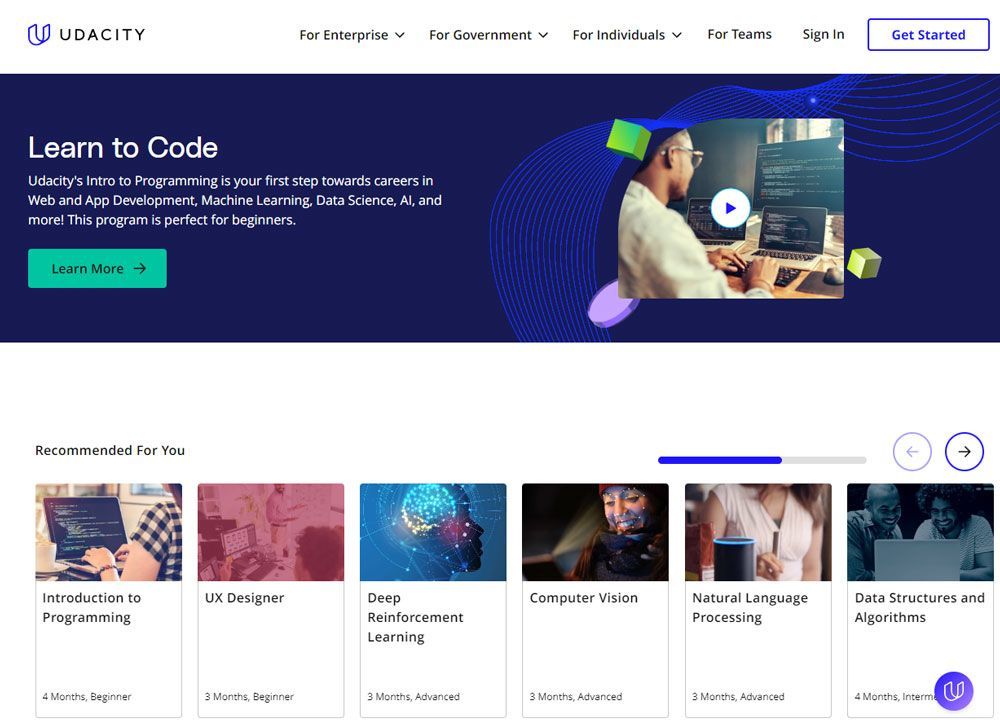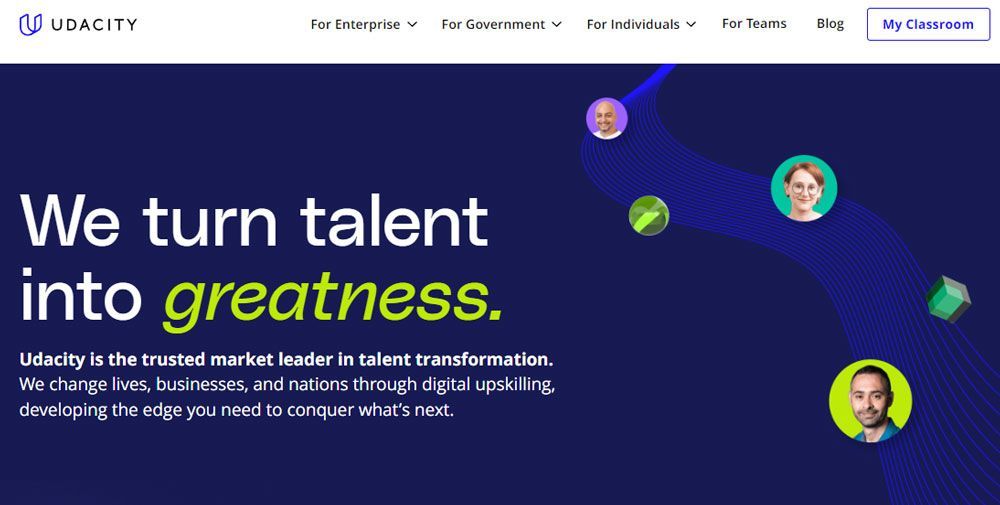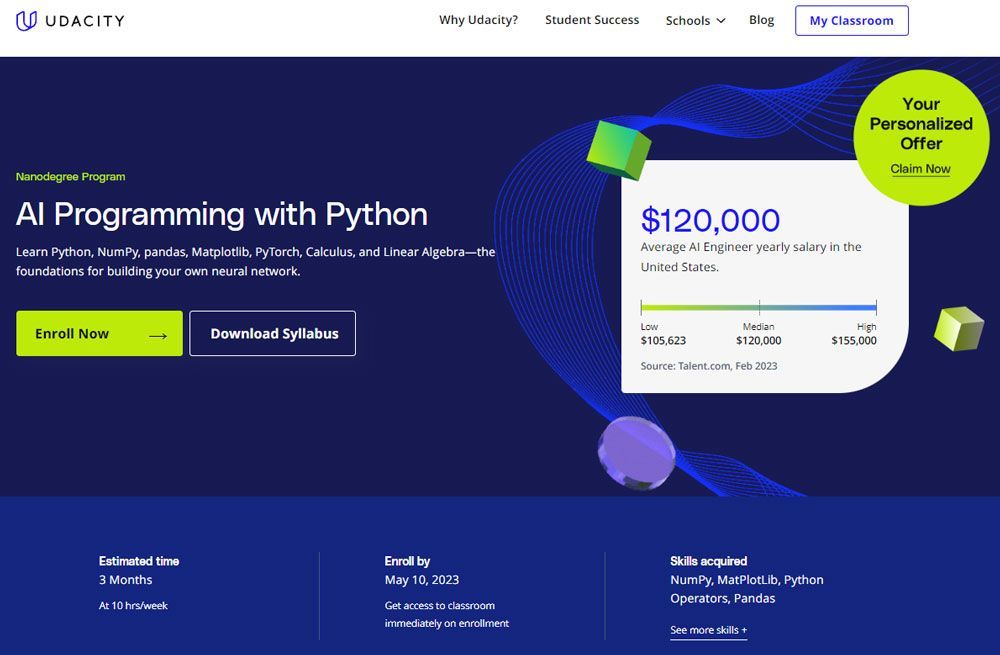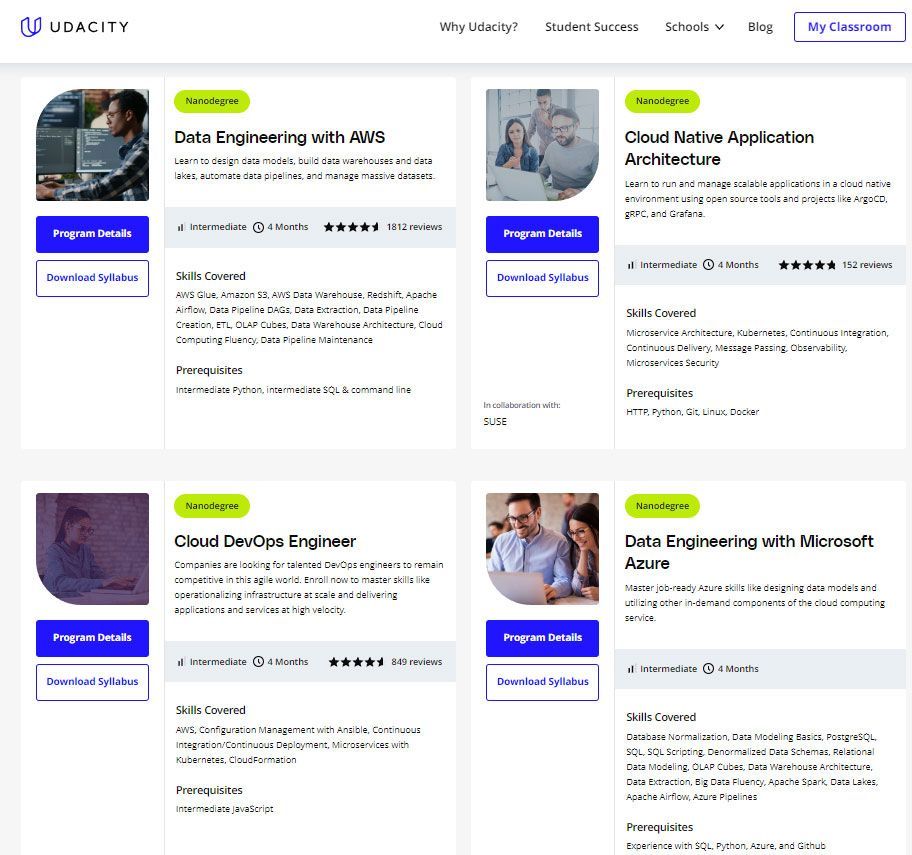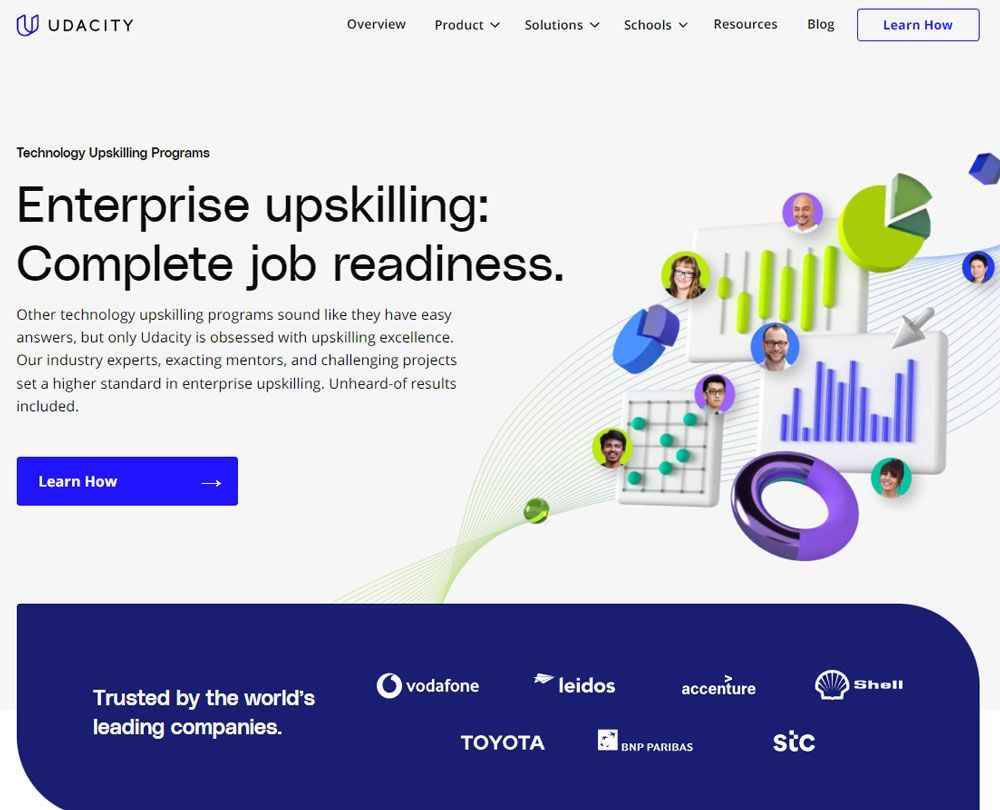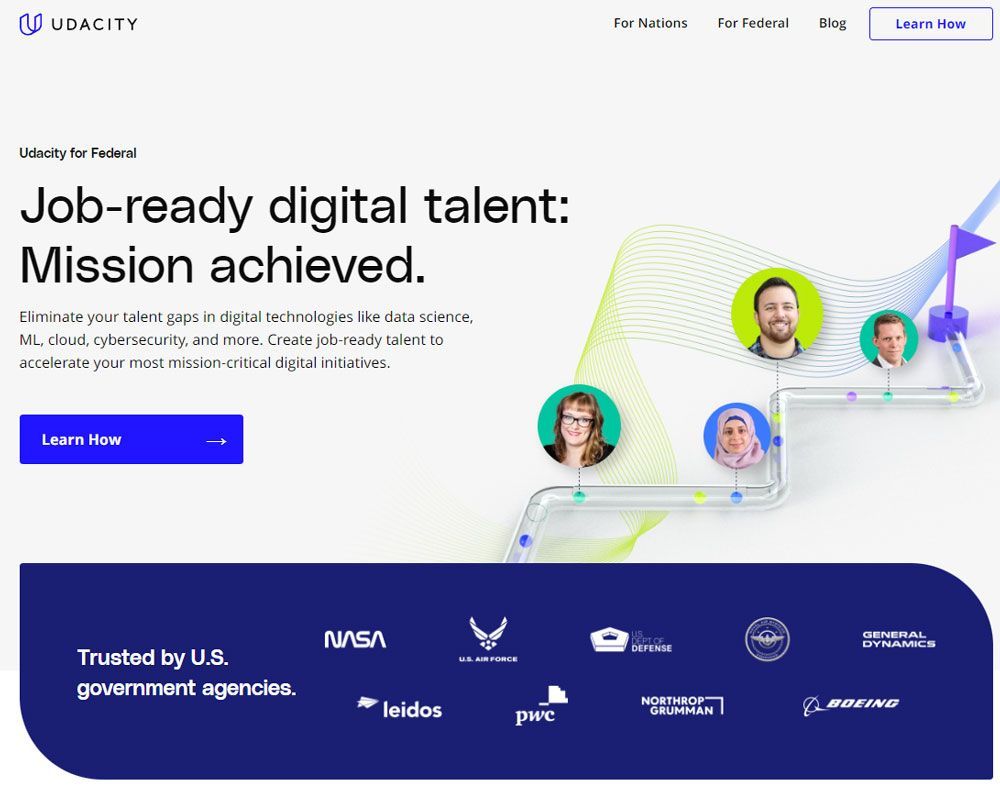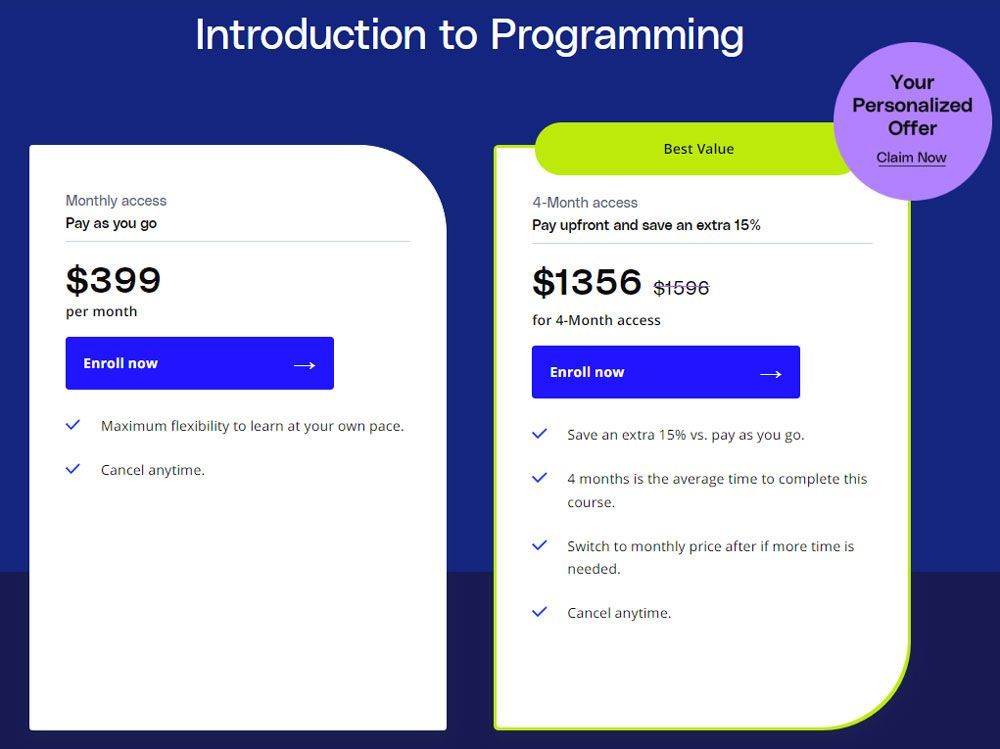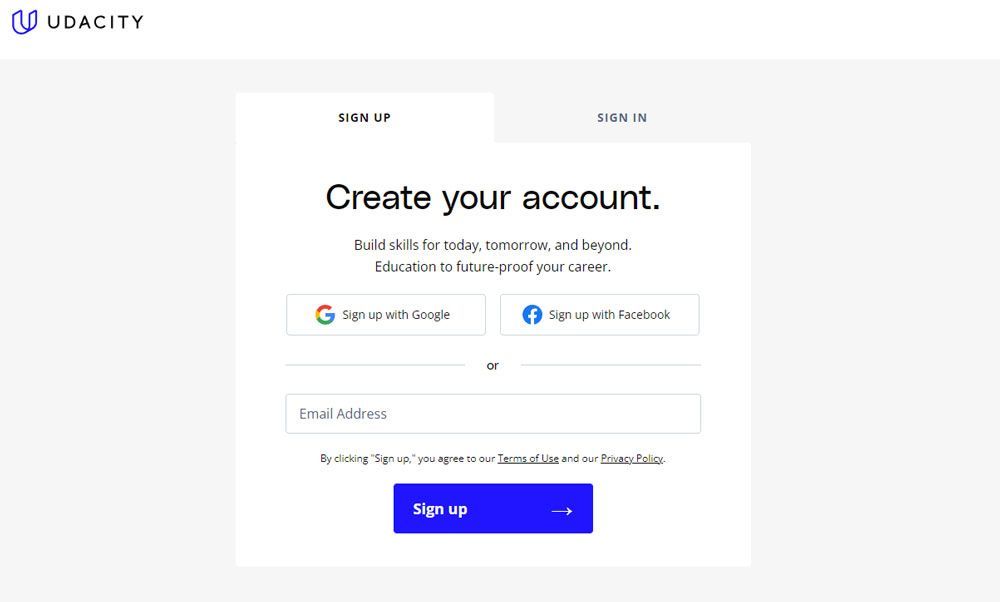Udacity Review for 2023
Author: Ignas Varkala
Some of the links on this page may link to our affiliates. Learn more about our affiliate policies.
Last Updated: May 7, 2023
Ah, Udacity, one of the first online learning platforms where I dipped my toes into the vast ocean of coding. I still remember those early days when the platform wasn't as polished as it is now. Back then, it was like trying to learn how to cook from a chef juggling flaming knives – impressive, but not exactly beginner-friendly.
The courses were quite pricey, and the instructors had a knack for skipping steps and jumping around like caffeinated kangaroos. Nevertheless, I was left scratching my head, wondering how on earth anyone but the most experienced programmers could keep up.
But times have changed, and both Udacity and I have come a long way since then. With a touch of dry humor and a dash of optimism, let's dive into this review and see if Udacity has managed to find its footing in the ever-competitive world of online education, considering that they still demand a pretty penny for their courses.
Overview and mission
Udacity is an online learning platform that aims to democratize education by offering accessible, affordable, and highly effective courses to people worldwide. The company was founded in 2012 by Sebastian Thrun, David Stavens, and Mike Sokolsky, aiming to empower learners to gain skills in high-demand fields, such as programming, data science, artificial intelligence, and more. Udacity primarily focuses on creating practical, hands-on learning experiences through its Nanodegree programs, designed to equip students with the skills required to succeed in the job market.
Platform features and user experience
Udacity differentiates itself from other
online learning platforms through its top-quality content, intuitive interface, and career services. These features make the learning experience enjoyable, engaging, and fruitful for students.
Top-quality content
One of the most significant advantages of Udacity is its commitment to delivering high-quality content. The courses are designed and taught by industry experts who bring their real-world experience and knowledge to the classroom. In addition, the curriculum is updated regularly to keep pace with the ever-changing industry requirements, ensuring that students stay relevant in their chosen fields.
Intuitive interface
Udacity's platform is designed to be user-friendly and easy to navigate. The interface is clean and straightforward, allowing learners to focus on their coursework without getting bogged down by unnecessary distractions. The course materials are organized into bite-sized lessons, which makes it easy to fit learning into even the busiest schedules. Additionally, the platform offers various tools and resources, such as quizzes, coding exercises, and project reviews, to help students master the material and gain confidence in their skills.
Career services
Another standout feature of Udacity is its commitment to helping students advance their careers. Udacity offers career services, such as resume reviews, LinkedIn profile reviews, and mock interviews, to ensure that students are well-prepared for the job market. Furthermore, Udacity has partnered with several leading tech companies to create a network of potential employers for its graduates, increasing their chances of landing a job in their chosen field. In my experience, Udacity's career services have been instrumental in helping many students find success in their careers.
Certificates
Upon completing a Nanodegree program, Udacity awards students a verified certificate showcasing their newly acquired skills. These certificates can be shared on LinkedIn or included in a portfolio or resume, which can help demonstrate proficiency in a specific subject area to potential employers. In my experience, Udacity certificates are well-regarded in the tech industry and can be valuable when job hunting or seeking career advancement.
Limitations and drawbacks
While Udacity has many advantages, there are a few limitations and drawbacks that potential learners should consider before enrolling in a program. These include pricing and budget considerations, limited topic selection, language restrictions, and the absence of a mobile app. One of the things that pushed me away from Udacity was the content gaps that occurred when instructors were teaching beginners classes as if they already knew how to code well. There were sudden topic switches and skipping of some essential parts, like a walkthrough of programming environment setups.
Pricing and budget considerations
Udacity's Nanodegree programs can be expensive compared to other online learning platforms. The cost of a Nanodegree program typically ranges from several hundred to over a thousand dollars, which may be prohibitive for some learners. However, Udacity offers eligible students financial assistance and scholarships; the potential return on investment in improved job prospects and increased earning potential should be weighed against the upfront cost.
Limited topic selection
While Udacity offers a variety of courses in high-demand fields, its focus on technology-related subjects means that the platform may not be suitable for learners seeking education in other areas, such as humanities or social sciences. Explore other online learning platforms if you're looking for a broader range of topics.
Language restrictions
Currently, Udacity's courses and Nanodegree programs are primarily available in English. This may challenge non-English speakers or those uncomfortable with the language. In addition, although some courses have subtitles in other languages, the lack of comprehensive language support may limit the platform's accessibility for some learners.
Absence of a mobile app
As of my knowledge cutoff in September 2021, Udacity does not offer a dedicated mobile app for its courses. This means learners must access the platform through a web browser on their mobile devices, which can be less convenient and user-friendly than a native app. This may be a drawback for learners who prefer to study on the go or have limited desktop or laptop computer access.
Udacity Course Offerings
Udacity's course catalog covers various technology and digital skills topics. In this section, I'll dive into the various course categories and popular programs that Udacity offers to help you understand the platform's diverse offerings and find a program that suits your interests and career goals.
Course categories and popular programs
Programming and Development
Udacity's programming and development courses are designed to teach essential coding and software development skills. Some popular programs in this category include the Full Stack Web Developer Nanodegree, the Front End Web Developer Nanodegree, and the Android Developer Nanodegree. These programs cover a variety of programming languages and technologies, such as Python, JavaScript, HTML, CSS, and more.
Artificial Intelligence
The artificial intelligence (AI) courses at Udacity cover machine learning, deep learning, computer vision, and natural language processing. Popular programs in this category include the Machine Learning Engineer Nanodegree, the AI Programming with Python Nanodegree, and the Deep Learning Nanodegree. These courses equip learners with the knowledge and skills to build AI-powered applications and systems.
Cloud Computing
Udacity's cloud computing courses teach students how to design, build, and manage applications and infrastructure on cloud platforms such as AWS, Microsoft Azure, and Google Cloud. Some popular programs in this category include the Cloud Developer Nanodegree, the Cloud DevOps Engineer Nanodegree, and the AWS Cloud Architect Nanodegree. These programs offer hands-on learning experiences that prepare students to work with cutting-edge cloud technologies.
Data Science
Data science courses at Udacity teach students how to collect, analyze, and visualize data using various programming languages, tools, and techniques. Popular programs in this category include the Data Analyst Nanodegree, the Data Engineer Nanodegree, and the Data Scientist Nanodegree. These courses cover data wrangling, visualization, machine learning, and big data processing.
Business
Udacity offers business courses that help learners acquire digital marketing, product management, and business analytics skills. Popular programs in this category include the Digital Marketing Nanodegree, the Product Manager Nanodegree, and the Business Analytics Nanodegree. These programs are designed to help students develop the skills necessary to succeed in the modern digital business landscape.
Autonomous Systems
The autonomous systems courses at Udacity focus on teaching students how to develop and work with self-driving cars, robotics, and other autonomous technologies. Popular programs in this category include the Self-Driving Car Engineer Nanodegree, the Robotics Software Engineer Nanodegree, and the Flying Car and Autonomous Flight Engineer Nanodegree. These programs cover computer vision, machine learning, and control systems.
Career
Udacity also offers career-focused courses that help learners improve their job search and professional development skills. These courses cover resume writing, LinkedIn optimization, and interview preparation. While these courses are not part of any specific Nanodegree program, they are designed to complement the technical skills acquired in other programs and enhance students' overall career prospects.
Udacity for Enterprise
Udacity for Enterprise is a program designed to help businesses upskill and reskill their workforce to stay competitive in the rapidly changing technology landscape. This program offers customized learning solutions and access to Udacity's comprehensive course catalog, allowing companies to provide their employees with the skills needed to drive innovation and growth.
Udacity for Government
Udacity for Government is a program aimed at helping governments equip their workforce with the skills required to succeed in the digital economy. This program provides governments access to Udacity's advanced technology courses and career services, enabling public sector employees to gain valuable AI, data science, and cybersecurity skills. By investing in their workforce's education, governments can foster innovation and drive economic development in their countries.
Career Services
As mentioned, Udacity offers various career services to support student's professional development and job search efforts. These services include:
- Resume and cover letter reviews: Udacity's career professionals provide personalized feedback on students' resumes and cover letters, helping them to showcase their skills and experience effectively.
- LinkedIn profile reviews: Students receive guidance on optimizing their LinkedIn profiles, ensuring they present a professional image and leverage the platform's networking opportunities.
- Mock interviews: Udacity offers mock interviews to help students practice and hone their interviewing skills, increasing their confidence and chances of success in real job interviews.
- Career coaching sessions: Students can access one-on-one career coaching sessions, during which they can discuss their career goals, job search strategies, and any other professional development concerns with an experienced career coach.
- Job search resources: Udacity provides many job search resources, including job listings, networking tips, and advice on navigating the job market in various industries.
By offering these comprehensive career services, Udacity is committed to helping students acquire valuable technical skills and succeed in their chosen careers.
Udacity Student Community and Support
Another aspect of Udacity that sets it apart from other online learning platforms is its emphasis on creating a supportive and collaborative learning environment. Udacity achieves this through its student community and various support resources, which I will discuss below.
Student Community
Udacity's student community is an active and diverse network of learners who share knowledge, ask questions, and help each other succeed. The platform offers several avenues for students to connect and collaborate, including discussion forums, Slack channels, and Facebook groups. This sense of community fosters a spirit of camaraderie and creates an atmosphere where students can learn from their peers, share their challenges, and celebrate their achievements.
Mentor Support
Students enrolled in Udacity's Nanodegree programs receive personalized support from dedicated mentors. These mentors are industry professionals who offer guidance, answer questions, and provide encouragement throughout the learning journey. Students can contact their mentors via chat, email, or video calls, ensuring they receive the support they need when needed.
Project Reviews
Udacity's hands-on, project-based approach to learning involves students completing real-world projects demonstrating their mastery of the course material. Students receive detailed feedback and constructive criticism from expert reviewers upon project submission. This feedback helps students refine their work, identify areas for improvement, and ultimately, develop a strong portfolio of projects that showcases their skills to potential employers.
Technical Support
Udacity provides technical support to students with issues with the platform, course materials, or learning tools. The support team is available through email or chat, ensuring that students receive prompt assistance when they face technical difficulties.
Udacity's commitment to fostering a supportive and engaging learning environment is one of the platform's greatest strengths. By providing students with a robust network of peers, mentors, and support resources, Udacity ensures that learners have the tools and assistance they need to succeed in their educational pursuits and beyond.
Pricing, Scholarships, and Financial Aid
Udacity's commitment to making education accessible and affordable is reflected in its pricing structure, scholarship opportunities, and financial aid options. Above, you can see the pricing structure for Introduction to Programming Nanodegree Program. Udacity usually offers you to either pay monthly fee (more expensive), or save around 15% and pay for a 4 month period.
While it does look like you are getting savings if paying for 4 months in advance, keep in mind that you could finish these Nanodegree programs in 1 month and only pay a fraction of the 4 month amount. So in most cases, the route you choose will depend on you, your budget and the time that you can allocate for the courses. In this section, I will discuss these aspects to understand how Udacity helps students invest in their education without breaking the bank.
Udacity's pricing structure
Udacity's pricing structure varies depending on the course type and the program's length. While some courses are free, Nanodegree programs come with a cost. The price of a Nanodegree program typically ranges from several hundred to over a thousand dollars, and payment options include monthly or one-time payments. Students who pay for the entire program upfront often receive a discount on the total cost.
In addition to the Nanodegree programs, Udacity offers single and bundled courses that can be purchased separately. The prices for these courses vary, but they generally offer a more affordable alternative for students looking to gain specific skills without enrolling in a full Nanodegree program.
Scholarship opportunities
Udacity partners with various organizations and companies to offer scholarship opportunities for students who demonstrate financial need, exceptional talent, or a strong interest in pursuing a career in technology. These scholarships often cover the full cost of a Nanodegree program. In addition, they may include additional benefits, such as personalized mentorship, career services, and access to a dedicated community of fellow scholars.
Some of the scholarship programs that Udacity has offered in the past include the Google Developer Scholarship, the Bertelsmann Data Science Scholarship, and the Women Techmakers Scholarship. While the availability of scholarships may vary over time, interested students can check Udacity's website or subscribe to their newsletter to stay informed about the latest opportunities.
Financial aid options
Udacity recognizes that the cost of a Nanodegree program may be prohibitive for some students and therefore offers financial aid options to eligible learners. Students can apply for financial aid by submitting an application that details their financial situation, educational background, and career goals. If approved, financial aid recipients may receive a discount on the cost of the Nanodegree program, making it more accessible and affordable.
By offering various pricing options, scholarships, and financial aid, Udacity demonstrates its commitment to helping students overcome financial barriers and invest in their education. In addition, this approach ensures that a diverse range of learners can access Udacity's high-quality courses and gain the skills they need to succeed in the technology industry.
Creating and Managing a Udacity Account
Navigating Udacity's platform is simple and user-friendly, allowing you to focus on learning and achieving your goals. In this section, I'll discuss setting up and customizing a Udacity account and tracking your progress and achievements.
Account setup and customization
Creating a Udacity account is a straightforward process. To start, visit the Udacity website and click "Get Started" or "Sign Up." You can sign up using your email address, Google, Facebook, or Apple account. Once you've signed up, you can complete your profile by adding personal information, such as your name, location, and profile picture.
Customizing your account is easy, too. You can browse the course catalog and enroll in the programs or courses that interest you. When you enroll in a course or Nanodegree program, it will be added to your account dashboard, where you can access the learning materials and track your progress.
Tracking progress and achievements
Udacity's platform makes monitoring your progress and achievements easy throughout your learning journey. On your account dashboard, you can view the courses and Nanodegree programs you've enrolled in and your progress in each program. You can also access your course certificates and project submissions from your dashboard.
As you complete courses and Nanodegree programs, you'll earn badges and certificates that showcase your achievements. These can be shared on LinkedIn or included in your resume or portfolio, helping you demonstrate your expertise to potential employers.
Udacity Instructors
Udacity's instructors play a crucial role in delivering high-quality education to students. In this section, I'll discuss the qualifications and expertise of Udacity's instructors.
Instructor qualifications and expertise
Udacity's instructors are industry professionals and subject matter experts with extensive experience in their respective fields. Many hold advanced degrees and have worked for top tech companies like Google, Facebook, and Amazon. These instructors bring real-world experience and practical insights to the classroom, ensuring that Udacity's courses are relevant, up-to-date, and aligned with industry trends.
In addition to their technical expertise, Udacity's instructors are skilled educators passionate about helping students succeed. They create engaging course content, provide personalized project feedback, and participate in the student community to offer support and guidance.
Alumni Outcomes and Success Stories
Udacity's alums have a history of achieving significant career transitions and advancements thanks to the platform's comprehensive education and career support services. In this section, I'll share some real-life experiences and testimonials and discuss the career outcomes of Udacity alums.
Real-life experiences and testimonials
Many Udacity alums have shared their experiences and success stories, highlighting the positive impact that Udacity's courses and Nanodegree programs have had on their careers. These testimonials often emphasize the quality of the course content; the support received from mentors and the student community, and the effectiveness of the career services provided by Udacity.
Some alumni have landed jobs at top tech companies, while others have successfully transitioned into new career paths or launched their businesses. These success stories inspire prospective students and demonstrate the potential of Udacity's education to transform lives.Selecting the right DataCamp course can be crucial to achieving your learning goals. Here are some tips to help you make the best choice based on my experience with the platform.
Career transitions and advancements
Udacity's focus on developing in-demand skills and providing comprehensive career support has led to impressive outcomes for many alums. Students who complete Udacity's courses and Nanodegree programs often experience significant career transitions, such as moving into more technical roles or entering new industries.
Furthermore, Udacity alumni often report increased earning potential and job satisfaction after completing their programs, reflecting the value of their skills and the impact of Udacity's career services on their job search and professional development. Udacity helps learners achieve their career goals and succeed in the rapidly evolving technology landscape by equipping students with industry-relevant skills and offering personalized career support.
In summary, Udacity's comprehensive course offerings, high-quality content, and robust career support services make it an attractive option for aspiring professionals seeking to advance their careers in technology. With a diverse range of programs, an intuitive interface, and a supportive learning environment, Udacity provides students with the tools and resources they need to succeed. In addition, the success stories of Udacity alums serve as a testament to the platform's effectiveness in helping students achieve their career goals and make significant advancements in their professional lives.
Tips for Finding the Perfect Udacity Course
As someone who has benefited from Udacity's courses, I'd like to share some tips for finding the perfect course that aligns with your skills, career goals, and interests. You can make the most of your time and effort on Udacity's platform by following these steps.
Assessing your current skill level
Before diving into Udacity's course catalog, assessing your current skill level is crucial. Udacity offers courses for beginners, intermediate learners, and advanced professionals, so having a clear understanding of your existing knowledge and expertise will help you choose a course that's appropriately challenging and relevant to your needs.
Take time to reflect on your experience and skills in the area you're interested in pursuing. If you're a beginner, look for introductory courses or Nanodegree programs covering the fundamentals. If you have some experience but want to deepen your knowledge, search for intermediate or advanced courses that build on your existing skill set.
Identifying your career goals and interests
Next, consider your career goals and interests. What do you hope to achieve by completing a Udacity course or Nanodegree program? Are you looking to transition into a new career, advance in your current job, or gain new skills for personal growth? Understanding your objectives will help you select a course that aligns with your goals and keeps you motivated throughout your learning journey.
Spend time researching the job market and industry trends in your desired field. Identify the high-demand skills and qualifications and look for courses or Nanodegree programs that teach those skills. Additionally, consider your interests and passions, as pursuing a course that excites you will make learning more enjoyable and fulfilling.
Researching program content and reviews
Once you've assessed your skill level and identified your career goals, it's time to dive into the details of the courses and Nanodegree programs that interest you. Start by thoroughly reviewing the program content, including the curriculum, learning objectives, and project requirements. This will help you understand what you can expect to learn and achieve throughout the program.
Also, take the time to read reviews from fellow students and alums. These firsthand accounts can provide valuable insights into the course content's quality, the instructors' effectiveness, and the overall learning experience. Please pay particular attention to reviews from students who have similar backgrounds, skill levels, and career goals, as their experiences may be more relevant to your own.
By following these tips, you can make an informed decision and choose a Udacity course or Nanodegree program that aligns with your skills, interests, and career objectives. With the right course selection, you'll be well on your way to achieving success in the technology industry and realizing your full potential.
Comparing Udacity with Other Platforms
As someone with experience with various online learning platforms, I'd like to compare Udacity and some of its popular competitors: Skillshare, Udemy, and Coursera. Understanding the differences between these platforms will help you decide which one best suits your learning needs and preferences.
Udacity vs. Skillshare
Skillshare is an online learning platform that offers various courses across various categories, including design, photography, and business. However, Skillshare focuses more on creative and lifestyle topics, while Udacity specializes in technology and career-oriented courses.
Udacity's Nanodegree programs offer a more structured and in-depth learning experience, focusing on hands-on projects, personalized mentor support, and career services. In contrast, Skillshare's courses are generally shorter and informal, often needing more depth and support provided by Udacity's programs.
If you're looking to develop technical skills and advance your career in the technology industry, Udacity is likely a better fit. However, Skillshare may be more suitable for exploring creative pursuits or picking up new hobbies.
Udacity vs. Udemy
Udemy is another popular online learning platform offering a vast course catalog across various subjects, including technology, business, and personal development. While both Udacity and Udemy provide a range of technical courses, the two platforms have some key differences.
Udacity's Nanodegree programs offer a more comprehensive and structured learning experience with hands-on projects, mentor support, and career services. In contrast, Udemy's courses can vary greatly in quality, depth, and support, as they are created by individual instructors rather than the platform itself.
If you're seeking a more rigorous and career-oriented learning experience with dedicated support, Udacity may be the better option. However, if you're looking for a broader selection of courses and more flexibility in pricing and commitment, Udemy could be a more suitable choice.
Udacity vs. Coursera
Coursera is an online learning platform that partners with top universities and institutions to offer various courses, specializations, and degree programs. Udacity and Coursera focus on providing high-quality, career-oriented courses, but the two platforms have some notable differences.
While both platforms offer hands-on projects and a structured learning experience, Coursera's courses are often more academic, reflecting the platform's university partnerships. Udacity, on the other hand, places a stronger emphasis on industry-relevant skills and practical applications, with courses designed in collaboration with leading tech companies.
In terms of support, Udacity's Nanodegree programs offer personalized mentorship and career services, while Coursera's support varies depending on the course or specialization. In addition, Coursera's pricing model includes subscription-based and one-time payment options, whereas Udacity primarily offers a monthly payment model for its Nanodegree programs.
If you're seeking a more practical, industry-focused learning experience with dedicated support, Udacity might be the better fit. However, if you prefer a more academic approach and want access to courses from top universities, Coursera could be the more suitable choice.
Final Thoughts: Is Udacity Worth the Investment?
As someone with firsthand experience with Udacity, I'd like to offer my perspective on whether the platform is worth the investment. In this section, I'll discuss ideal user profiles for Udacity, provide some recommendations, and explore alternative resources and platforms.
Ideal user-profiles and recommendations
Udacity is an excellent choice for learners looking to develop in-demand technical skills and advance their careers in technology. The platform is particularly well-suited for:
- Professionals seeking to transition into new tech-related careers or advance in their current roles.
- Students who want a more practical, industry-focused learning experience that complements their formal education.
- Self-directed learners who value structured programs, hands-on projects, and personalized support from mentors.
If you fall into one of these categories, Udacity's Nanodegree programs can provide the skills, support, and resources needed to achieve your career goals. The platform's focus on industry-relevant skills, collaboration with leading tech companies, and comprehensive career services make it a worthwhile investment for many learners.
Exploring alternative resources and platforms
While Udacity offers a valuable learning experience for many students, it's essential to consider alternative resources and platforms before deciding. As discussed earlier, platforms like Skillshare, Udemy, and Coursera offer a wide range of courses and learning experiences that may be more suitable for certain learners.
Before committing to Udacity, take the time to explore these alternatives and determine which platform best aligns with your learning needs, interests, and budget. Additionally, consider utilizing free resources, such as online tutorials, blogs, and forums, to supplement your learning and gain a well-rounded understanding of your chosen field.
Can Udacity help you get a job?
Yes, Udacity can help you get a job in the technology industry thanks to its focus on in-demand skills, hands-on projects, and comprehensive career services. However, it's essential to recognize that simply completing a course or Nanodegree program does not guarantee a job.
Udacity provides the tools, resources, and support needed to succeed in your job search. Still, it's ultimately up to you to apply those skills, network, and pursue job opportunities. Here's how Udacity can help you in your job search:
- Skills development: Udacity's courses and Nanodegree programs teach you the practical, industry-relevant skills employers seek, increasing your chances of finding a job in your desired field.
- Portfolio-building: The hands-on projects you complete during your Udacity program are tangible proof of your skills and expertise, which can be showcased in your portfolio and shared with potential employers.
- Career services: Udacity offers personalized career support, including resume reviews, LinkedIn profile optimization, and interview preparation, to help you stand out in the job market.
By leveraging these resources and putting in the effort to develop your skills, network, and pursue job opportunities, Udacity can help you succeed in the technology industry.
SkillEvolver Review Methodology
SkillEvolver.com follows a rigorous
methodology to create transparent, high-quality reviews of online learning platforms and financial products. Our team consists of professionals with extensive experience in these fields. We prioritize reader interests, test products under real-world conditions, and regularly update our content. Our reviews cover categories such as customer support, usability, and certificates. Adhering to a strict code of conduct, we ensure honesty and transparency in our content, making SkillEvolver.com a trustworthy source for reviews and information.

Empowering professional growth through innovative learning and comprehensive resources for skill development and career advancement.
QUICK LINKS
SECTIONS
Career Evolver
Personal Evolver
Mentality Evolver
